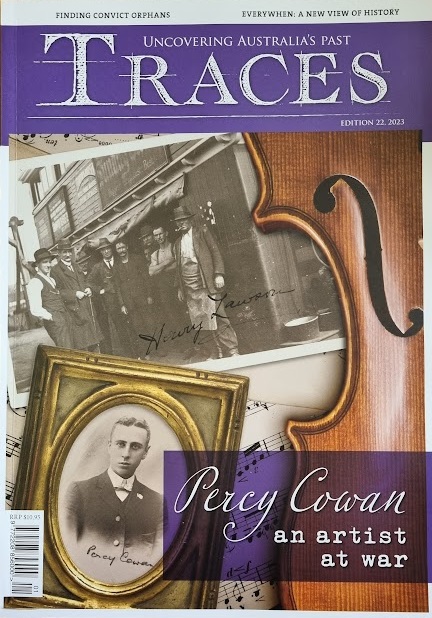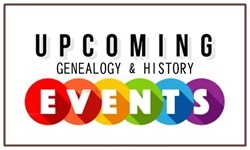Are You Listening? 25 Australian History and Genealogy Podcasts
Hands up how many of you listen to podcasts? Hmm, not enough of you. Before I get into that, let me start right at the very beginning by giving you the definition of podcast.
In simple terms, a podcast is a digital medium consisting of audio episodes that relate to a specific theme. The hosts of a podcast are referred to as “podcasters.”
So in essence it’s an audio recording that you can listen to on your computer, iPad, or phone. There are literally hundreds of thousands of podcasts available to listen to, on just about any topic that you can think of – just browse Audible to get an idea. They can be fun and entertaining, they can be horrifying, or they can be educational. Podcasts are great to listen to while you’re travelling.
Anyway today I just want to highlight a few Australian history and genealogy-related ones for you. Please note it takes a LOT of work and dedication to create a podcast, and as you’ll see some of those listed below are not currently active, but I’ve included them as you can still listen to the past episodes.
—-
AdeLOL – Adelaide & SA’s Hilarious History Podcast
https://adelol.podbean.com/
Stories of South Australia and Adelaide’s unique, and often hilarious, past.
Australian Ancestry Podcast
https://australianancestrypodcast.podbean.com/
The Australian Ancestry Podcast helps you make the most of your uniquely Australian family history research by providing insights into how to perform your research in Australia, overview of historical trends in Australian migration & settlement and interviews with leading Australian researchers.
Aussie History Podcast
https://player.fm/series/aussie-history-podcast
The Aussie History Podcast, (also known as the Aussie Waves Podcast) tells Australian history though the lens of all those peoples who have made the journey from other lands to call Australia home.
Australian Histories Podcast
https://www.australianhistoriespodcast.com.au/
The Australian Histories Podcast aims to take a fresh look at some of the brilliant stories from Australia’s past. Jenny is the host, and through her podcasts, she hopes to share with you an overview of various interesting episodes in Australian History, as well as some humour, interest and perhaps even a new perspective from those in your high school history textbooks!
Bookmark This Podcast
https://www.nla.gov.au/stories/podcast#
Bookmark This is a podcast from the National Library of Australia. Season one, Off Stage, explores the vibrant characters, milestone moments and cultural treasures found in the exhibition On Stage: Spotlight on Our Performing Arts. It delves into the untold stories of Australia theatre, dance, music and film. Season two, Bold Types is hosted by political reporter and author Amy Remekis. and it celebrates the pioneering women who took the world of journalism by storm, with each episode featuring contemporary female journalists reflecting on their experiences and those of their forebears.
Collected: Stories from the Australian War Memorial Podcast
https://player.fm/series/collected-stories-from-the-australian-war-memorial
Collected: Stories from the Australian War Memorial explores the artefacts that make up the museum of the Australian War Memorial and uncovers the stories that the public don’t always get to hear.
Convict Australia Podcast
https://podcasts.apple.com/au/podcast/convict-australia/id1550720354
A podcast about the convicts that were transported to Australia. Each episode offers a glimpse into life as a convict and a broader insight into the convict system. Presented by Jennifer Twemlow, author of ‘Convict Sydney: the real-life stories of 32 prisoners’.
Deviant Women Podcast
https://deviantwomenpodcast.com/
Alicia and Lauren are the hosts of Deviant Women. Every fortnight they discuss a different ‘deviant’ woman from history, fiction, mythology and the contemporary world: those who aren’t afraid to break the rules, to subvert the system, to explore, to seek and to challenge the status quo. While those covered in their podcast are not necessarily from Australia, Lauren and Alicia are, so for that reason I’ve included it here.
Downunder Genealogy Podcast
https://podcasts.apple.com/us/podcast/downunder-genealogy/
An Aussie genealogist who loves everything genealogy and wants to help and support others!
Goldfields Stories of Western Australia Podcast
https://player.fm/series/goldfields-stories-of-western-australia
History and stories of the Western Australian Goldfields written by local historian, Norma King (OAM) and Lorraine Kelly.
Forgotten Australia Podcast
https://forgottenaustralia.com/
From the desperate struggle against Spanish Flu in Sydney and the weekend Melbourne was ruled by anarchic mobs, to Brisbane’s most puzzling murder mystery and the Lord Howe Islander who tried to save passengers on the Titanic, each episode of Forgotten Australia brings you an incredible true story that you didn’t learn in history class.
Heaps Good History Podcast
https://player.fm/series/heaps-good-history
Exploring incredible true stories from South Australia’s past. A podcast brought to you by The Advertiser, in Adelaide.
The History Detective Podcast
https://historydetectivepodcast.com/
This began during the Pandemic, though the planning starte earlier. The site now has more than 35 episodes that look at different aspects of Australian History, including lesser known women from history and many stories about First Nations History.
History Lab Podcast
https://historylab.net/
History Lab is Australia’s first investigative history podcast. And they’ve got some good stories to tell. But they are interested in much more than just the story. Instead of an academic or other expert telling you what to think, History Lab wants to draw you in to the investigative process. It wants you to come along with us as we try to make sense of the traces the past leaves in the present.
The History Listen Podcast
https://www.abc.net.au/radionational/programs/the-history-listen
New and compelling stories from Australia and around the world, told by some of our most popular and trusted historians. Step inside a time machine for an immersive journey through history, where stories of people, places and events bring the past vividly into our present world.
The History of Australia Podcast
https://player.fm/series/the-history-of-australia-podcast
This is a narrative history podcast. It tells the story of Australia starting with the dawn of the Australian land mass, and moves forward through time until the year 2000.
I Was Only Doing My Job: Australia’s Military History Podcast
https://player.fm/series/i-was-only-doing-my-job-australias-military-history
“I Was Only Doing My Job” is a fortnightly (Bi-weekly) Australian Military History podcast hosted by Ross Manuel. Instead of focusing on maps and dates, each episode is devoted to chronicling Australia’s Military History through the individual stories of those who served; where they grew up, what they did, and invariably what happened to them.
Jennyalogy Podcast
http://jennyalogypodcast.blogspot.com/
Jenny Joyce talks about genealogy resources for Australia, New Zealand and the United Kingdom and Ireland – Society & Culture.
Kick to Kick Podcast: Australian Football Podcast 1858 to Modern Day
https://player.fm/series/kick-to-kick-2370489
An Australian Rules Football podcast, that looks at the history of the AFL/VFL. We start way back in 1897, and each episode will cover a different year. Enjoy hearing about the origin of the clubs, rivalries, players, finals systems, and much more. Note: the current episodes review recent games, but scroll back for the old, old games.
Look History in the Eye Podcast
https://prov.vic.gov.au/look-history-eye-podcast
This is the podcast Look history in the eye produced by Public Record Office Victoria. We interview people who delve into public archives and uncover interesting truths about Melbourne and Victoria’s past. Discover the back story to some iconic Melbourne and Victorian people and places, and download the archival record which inspired each episode.
The Portrait Detective Podcast
https://www.portraitdetective.com.au/podcast/
The Portrait Detective is a podcast series that dives into the collections of the State Library to discover the stories behind iconic portraits from 1817 to 1865. Join Margot Riley from State Library of NSW and Cassie Gilmartin (The Portrait Detective) as they journey back in time to discuss each portrait’s significance and how they can help you learn more about your own photographs in your family history collection.
Rum, Rebels and Ratbags Podcast
https://player.fm/series/rum-rebels-and-ratbags-108129
Humourist and historian David Hunt and ABC 702’s Dom Knight take on Australian history and uncover the characters, events and a cat that you won’t find in the regular history books. This is not history for the faint-hearted.
Tales from Rat City Podcast
https://talesfromratcity.com/
Join David and Tom as they uncover the strange, little known and down-right bizarre history of the wild days of early Ballarat (Victoria). Their podcast is dedicated to uncovering the forgotten stories of Ballarat’s dark and bizarre past from the 1850s through to the 1920s.
Uncovering Family History Podcast
https://podcasts.apple.com/us/podcast/uncovering-family-history/id1592802967
Victoria’s podcast is a weekly podcast sharing stories discovered through family history research – the highs, the lows, the exciting and even the mundane.
WW1 Digger History Podcast
https://open.spotify.com/show/1XYRrpuUEJS4wqvvvMT2Vw
Phil Mannell presents true accounts by soldiers of the Great War (World War 1 / WWI ). This is primary history as told by the soldiers themselves, mostly Australian diggers but possibly tommies, poilus, doughboys, kiwis or others, with additional commentary and definitions. It is memoirs and diaries of real men and women who served in the Great War, recounting the horrors of war, life behind the trenches and on leave in England, France and around the Mediterranean.
—-
So there’s lots of variety there. Australia history as well as some regional histories, military history, convicts, women’s history, as well as genealogy related ones too. So plenty to listen to, and learn more about Australian history and genealogy. Podcasts are just another tool you can use for your education … and they’re ALL FREE!!
Join SLQ’s New Transcription Project
Original records are fabulous, but unless you have the days (or weeks) to sit onsite and view these records in the archive or library going through them page by page, they remain unknown to most of the world. So to make them more accessible they need to be indexed, or even better, transcribed. And that’s exactly what the State Library of Queensland is doing with their latest project.
They write …
Are you something of an expert at deciphering handwriting? Or are you interested in improving your transcription skills?
We have recently digitised the letters received by the Colonial Secretary of the British Colony of New South Wales which relate to the Moreton Bay settlement and Queensland from 1822-1860. The correspondence documents the daily activities of a penal settlement, including petitions from prisoners’ wives, supply requests for items needed to establish and maintain the settlement, and proposed infrastructure plans.
This is a large and historically significant collection of 42,000 pages of letters and documents. These letters have never been available online before and will be a valuable research resource. However, the machine-generated transcripts of the Colonial Secretary’s letters are, on average, 50% accurate. Technology is great, but there is no substitute for the human perspective in deciphering handwriting.
So if you are interested in Queensland history, family history, or you simply enjoy the challenge of decoding handwritten documents, they would welcome your help. To be a part of their project, you can sign up at From The Page and start transcribing.
Traces Magazine – Issue 22 (April 2023)
If you have a love of Australian history and genealogy, this is just what you need. As with all every issue of Traces, this one is packed with high quality Australian history and genealogy-related articles.
Issue 22 recently hit the newsagent shelves, (or your letterbox if you’re a subscriber), so what great articles are in this issue?

In this edition Traces welcomes back some regular writers, and several new contributors.
Karoline Cernoch explores the stunning Waverley Cemetery, and the social and cultural factors that led to its development.
Dr David Waldron shares the grizzly story of Fitzroy’s Hand of Glory, and the folklore maintained by Melbourne’s 19th-century immigrants.
The genealogy section features a fascinating article by Lucy Frost about convict orphans, transported from Australia with their convict mothers, and how to find them in your family tree.
While the cover story, written by Peter Baker, charts the rise and tragic fall of violinist and entertainer Percy Cowan, his wartime service and his enduring friendship with poet Henry Lawson.
There’s another “Vintage Vernacular” article, and a profile of the grand historical estate Edina, with its Scottish connections. But there’s plenty more to discover in this edition’s pages, so if you love Australian history and/or genealogy, do yourself a favour, and grab a copy of Traces.
Available in both printed and digital form, you can subscribe through iSubscribe or Traces magazine directly. You can buy the current issue from some newsagents, and back issues of the magazine from Traces magazine themselves.
More information:
Website: http://tracesmagazine.com.au/
Follow along:
Facebook: https://www.facebook.com/TracesMag/
Twitter: https://twitter.com/traces_mag
Instagram: https://www.instagram.com/tracesmag/
More Australian Archives to get much needed funding
We all heard the absolutely fabulous news from the Australian Federal government in their May Budget, about the National Library of Australia and Trove receiving funding, but I will admit to missing the fact that they were only 1 of 9 Australian cultural organisations to share in over $530 million dollars in funding million over the next four years. Yes, it’s true.
And there’s no doubt that this funding is needed. Afterall the organisations have faced funding cuts for years, which resulted in less staff, and less staff to do the required tasks needed to preserve our heritage and the records that go with it. And then there’s the cost of mantenance to the buildings, for which there was simply no money available … until now. So this is fabulous news, not only for the National Library of Australia, but all of these important archives.
National Library of Australia (and Trove)
The National Library of Australia gets the biggest increase in funding with $146.2 million over the next four years. That includes funding specifically for the Trove program which offers digital access to historical documents, along with money to expand its storage and fix its main building in Canberra, which was seriously damaged in a severe hailstorm in early 2020. **
More info => https://www.nla.gov.au/Australian National Maritime Museum
The Australian National Maritime Museum welcomes $23 million in funding from the recent Federal Budget. Ms Daryl Karp AM, Director and CEO said, ‘We are delighted that the government has established a cultural policy and is supporting and investing in the arts, culture, and community. ‘This announcement gives us much needed short term and ongoing funding – in the first instance, to do urgent work repairing and maintaining our fleet, wharves, and ageing infrastructure. The ongoing uplift will help to alleviate the pressure that the Maritime Museum faces with the rising costs of suppliers, labour and ongoing maintenance of our harbourside site.’
More info => https://www.sea.museum/Bundanon Trust
Australian Prime Minister, The Hon Anthony Albanese MP, announced $33 million in funding for Bundanon. This funding will give Bundanon a sustainable future, allowing it to grow in the new infrastructure, reach new audiences, and build and deliver innovative exhibitions, live programs, multi-disciplinary residencies and learning opportunities for all ages within the landscape of the Shoalhaven, on south coast NSW. As the only National Collecting Institution in regional Australia, Bundanon has an important role to play in shaping the nation’s cultural identity.
More info => https://www.beagleweekly.com.au/Museum of Australian Democracy – Old Parliament House
The Museum of Australian Democracy at Old Parliament House (MoAD) welcomes the funding announcement by the Prime Minister and Minister for the Arts of $37.9 million over 4 years. MOAD’s role is to protect and preserve the significant heritage building of Old Parliament House (OPH), and to celebrate the spirit and stories of Australian democracy and the power of our voices within it through exhibitions, content and programming.”‘This funding commitment is a testament to the importance of this building and its place in Australia’s history. It will allow us to strengthen our historical interpretation, collections, exhibitions and digital engagement programs to share with all Australians”.
More info => https://www.moadoph.gov.au/National Archives of Australia
National Archives of Australia will receive $36.5 million in the next Federal Budget. With over 45 million items in their care ‘an additional $36.5 million for National Archives means we can continue to digitise records and make accessible our vast and growing collection. We hold records and items of significant importance to our nation including military service, immigration, First Nations Australians and much more.’
More info => https://www.naa.gov.au/National Film and Sound Archive of Australia
The National Film and Sound Archive of Australia (NFSA) will receive an additional $41.9 million in Federal Government funding over four years to digitise the nation’s at-risk audiovisual heritage.
More info => https://www.nfsa.gov.au/National Gallery of Australia
The National Gallery of Australia will be given a $76 million “booster” to bolster its operations and an extra $42 million to fix its leaky building, under a federal government boost hailed by its director as the most significant since the institution’s opening.
More info => https://nga.gov.au/National Museum of Australia
The National Museum of Australia in Canberra has applauded a federal government announcement of a major $78.3 million funding boost over the next four years, in the upcoming federal budget.
More info => https://www.nma.gov.au/National Portrait Gallery of Australia
From their Facebook page … “Like our fellow national collecting institutions, we’re so incredibly uplifted to hear this morning’s funding announcement! As the new kids on the block, funding of $27 million over four years will be absolutely transformational. We are so very grateful for the ongoing and unprecedented support provided to us by the Prime Minister, Anthony Albanese; the Minister for Finance, Katy Gallagher; and the Minister for the Arts, Tony Burke MP. With this increased funding, we plan to proactively continue to enhance the understanding of the Australian people – our identity, history, culture, creativity and diversity – through portraiture”.
More info => https://www.facebook.com/PortraitAu/
** I note that the amount mentioned here for both the National Library of Australia and Trove is significantly higher than the reports I read earlier. So if this figure is correct, that’s even better news for not only yhe NLA and Trove teams, but for everyone using their facilities, both online and in person.
A huge thankyou to the Australian government for this funding. It was so desperately needed for these organisations to be able to preserve, protect and share Australia’s history with the world.




